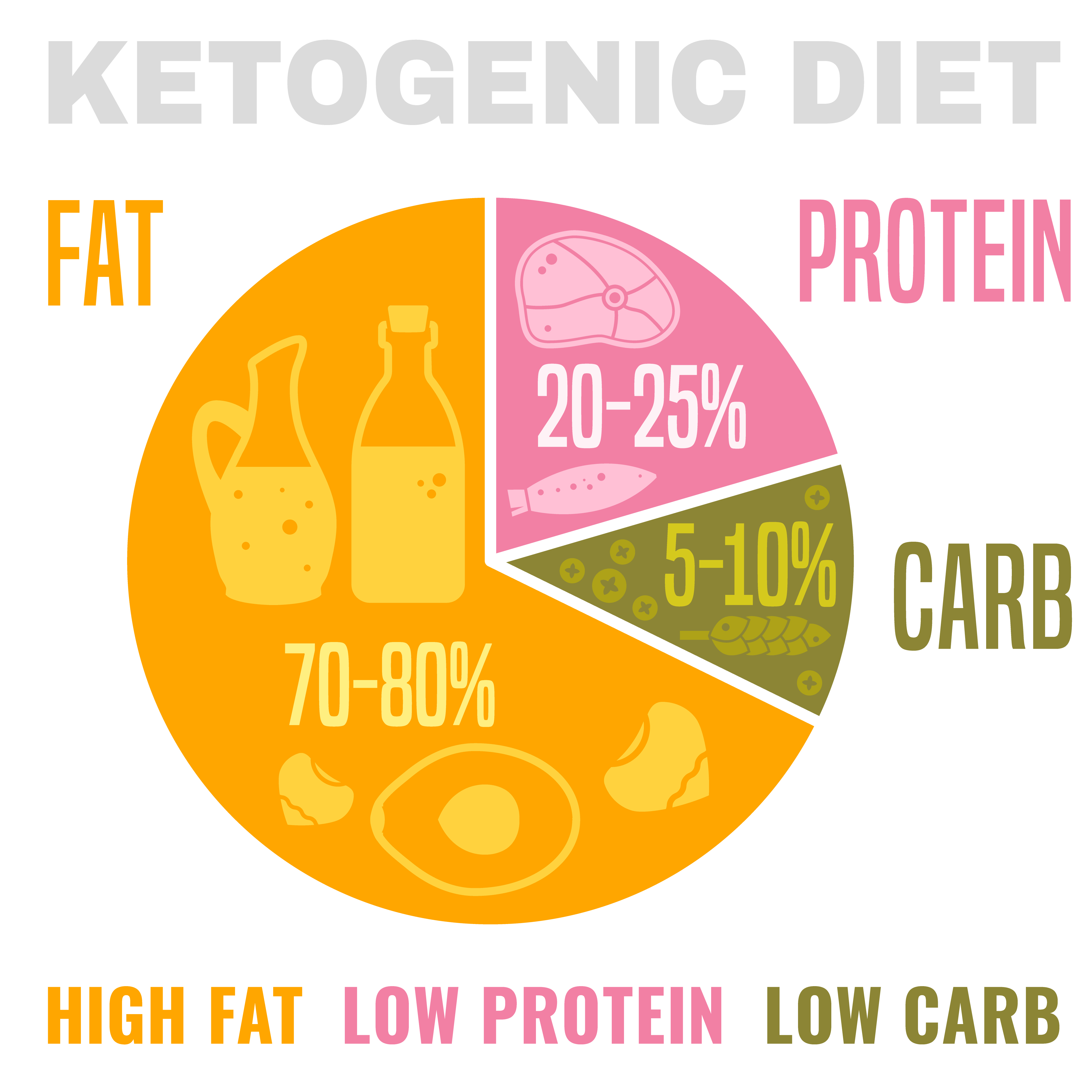The popularity of the keto diet increased over the last few years and now seems to be fading slightly. For a period, you saw highly processed keto items with unhealthy ingredients popping up everywhere and recipes featuring butter, cream cheese, and bacon filling social media. While to some this may have felt like a great opportunity to indulge in foods that in the past were labeled as “bad” or “off-limits”, this diet does not come without risks.
The keto diet was rated the worst diet of 2023 by U.S. News and World Report because of its lack of flexibility, being overly restrictive, and possibly creating nutritional imbalances. It is extremely strict and very hard to maintain.
Research into the long-term effects of the keto diet is limited, however, research has shown that a calorie-controlled diet is more sustainable in the long term and produces the same amount of weight loss over a year. Most studies on the effects of the keto diet have only been focused on short-term results and there is not a lot of information on how this diet impacts health over the long term.
What is the Keto Diet?
The keto diet is a very low carbohydrate diet that restricts grains, fruits, dairy products, and starchy vegetables. The goal of the keto diet is to put the body into ketosis. To achieve ketosis, the diet recommends only 5% of your calories come from carbohydrates. By comparison, most healthy eating guidelines recommend about half of the daily calories come from a variety of carbohydrate sources. On the keto diet, this usually equates to eating only 20-50 grams of carbohydrates per day.
Protein is restricted to 20% of calories, which a lot of people overlook with this diet plan. They understand they need to significantly reduce carbs, but they miss that they are also supposed to eat lower amounts of protein. Many people will restrict their carbs and overeat on protein, which can keep them out of ketosis. A common misconception is that the keto diet is just like the Atkins diet, low carb and high protein.
The majority of calories on the keto diet comes from fat, as it requires 75% of your calories come from fat. Most health recommendations suggest a range of 20-35% of calories from fat. This means the diet consists of mainly butter, oils, eggs, avocados, cheese, high-fat meat/fish, and non-starchy vegetables. For a 2,000-calorie diet, a keto plan would include almost 165 grams of fat per day. Because this level of fat can be hard to reach, people have been known to add “fat bombs” and spend a lot of money on specialized “keto” foods that are very expensive and full of questionable ingredients.
When your body has inadequate glucose from carbohydrate foods, its metabolism adjusts for survival without its preferred source of fuel. The body starts to break down ketone bodies instead of glucose for fuel which is known as ketosis. Ketones are produced in the liver and the body starts to rely primarily on fat for energy instead of carbs.
People often notice lower blood sugar and rapid weight loss while in ketosis and this often is the draw for people to try this diet, however just because something leads to these results quickly does not mean it is necessarily healthy or right for everyone.
What Are The Dangers Of The Keto Diet?
Dangerously Low Blood Sugars
Some people may experience very low blood sugar while on the keto diet. This is more common for those with type 1 diabetes or those who are on diabetes medications. Someone on insulin may not know how to adjust their medication and risk taking too much medication while not consuming enough carbs. In adults with Type 1 diabetes, the keto diet resulted in more frequent and extreme low blood sugars, with an average of 6.3 episodes a week compared to 1-2 episodes a week, while on the keto diet versus a conventional diet.
Nutrition Deficiencies
Any diet that restricts large food groups runs the risk of leading to inadequate nutrient intake. The keto diet restricts very nutrient-dense foods which could lead to low intakes of many vitamins and minerals. Fiber, magnesium, potassium, calcium, phosphorus, and vitamins D, B, C, and E are low on the keto diet, and over time this could lead to nutrition deficiencies. One study found that following a very low-carb diet only provided the right amounts of 12 of the 27 essential vitamins and minerals.
Poor Heart Health
Many of the foods recommended to eat for heart health are strictly limited on the keto diet while many of the foods that are recommended to avoid are encouraged. High-fat meats and dairy are rich sources of saturated fat which have been shown to increase the risk for heart disease and increase LDL (“bad”) cholesterol. One of the biggest risks with this diet is how high it is in saturated fats. The Dietary Guidelines for Americans and the American Heart Association recommend that less than 10% of the calories in the diet come from saturated fat because of their link to heart disease.
Individuals with diagnosed diabetes are known to already have an increased risk for heart disease, and one study found that diabetics on the keto diet developed dyslipidemia, which increases the chance of clogged arteries, heart attacks, and strokes.
A diet that focuses on lean protein, more fresh fruits and vegetables, and whole grains has been proven to provide cardio-protective benefits.
Gallstones
Any diet that leads to rapid weight loss increases the risk for gallstones. Having stones in the gallbladder or bile ducts can be extremely painful. Some people will have what they call a “gallbladder attack” which usually occurs after eating a high-fat meal. Symptoms of gallstones include severe pain in the stomach area, pain in the back or between the shoulder blades, nausea/vomiting, fever, bloating, and gas. Since the keto diet forces the body to use fat as fuel, it leads to extra cholesterol in the bile which can cause gallstones, this also can happen with any diet that leads to rapid weight loss.
Decreased Bone Health
There may be a link between the keto diet and decreased bone health. It is thought that this type of diet leads to a loss in bone mineral density even when people are highly active which normally would help build up the bones.
Kidney Issues
The food items that are often included on the keto diet may increase the risk of kidney stones. A diet high in animal foods can increase the acid in your blood and urine which leads to more calcium loss through the urine. Keto may also reduce the amount of citrate in the urine which can also increase the risk for stones.
For someone with existing chronic kidney disease, the keto diet could speed up the process of kidney disease and lead to acidosis. For this reason, the keto diet is not recommended for those with kidney disease or at risk for kidney problems.
Liver Problems
For someone who already has liver disease, it is usually recommended to follow a low-fat diet. Since the keto diet is primarily fat and the liver would have to work extra hard to metabolize all the extra fat, this diet could worsen liver problems.
Constipation
The American Heart Association recommends eating about 25-30 grams of fiber a day. Fiber has important roles in the diet such as lowering cholesterol, promoting a healthy weight, boosting the immune system, and decreasing inflammation. But fiber is most known for preventing constipation and boosting digestive health. Many high-fiber foods are restricted on the keto diet, and it can be very difficult to meet the recommended daily fiber targets on this diet.
Disordered Eating
Anyone with a history of an eating disorder or disordered eating shouldn’t follow any strict diet restrictions or follow diets that list foods as good or bad, and requires counting and measuring. Since this diet can lead to yo-yo weight cycling and food fears it is not ideal for someone struggling or with a history of disordered eating. Avoiding certain foods could lead to problems with intense cravings and trigger a binge episode. It could intensify obsessive thinking about food/body and anxiety around food. Strict dieting of any sort should be avoided in this population.
Keto Flu
When carbohydrates are drastically decreased in the diet, the body switches from using glucose as fuel to using ketones and fat. This process can lead to a significant loss in body fluid, which can be confused as quick weight loss when really it is just water weight which often comes back on quickly when you return to eating a normal diet. Along with this loss of body fluid, it is common for people to experience flu-like symptoms as they are transitioning to the keto diet, this is known as the “keto flu.” This is thought to be due to dehydration and electrolyte imbalances with symptoms like the typical flu – fatigue, headache, nausea, etc.
While we are not discounting that there may be some benefits to the keto diet for certain people and that it can’t be done more healthily, it is however important for people to understand that this diet does not come without risks and that there is a high chance of failure as it is not a sustainable lifestyle.
Carbohydrates are very important for our overall health and serve many beneficial roles in the body. Eating healthy carbohydrates can help you reach and maintain a healthy weight, improve cholesterol and blood pressure, protect against inflammation, and can add a lot of nutrition to our plates. As this diet is starting to lose steam, let’s refocus on all the benefits of eating a balanced diet rather than looking for quick fixes and fads.










 Weight Loss
Weight Loss Health & Wellness
Health & Wellness Diabetes
Diabetes Heart Health
Heart Health Motherhood & Family
Motherhood & Family Dietary Restriction
Dietary Restriction Other Health Conditions
Other Health Conditions About Seattle Sutton
About Seattle Sutton